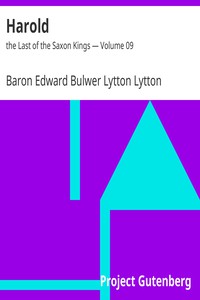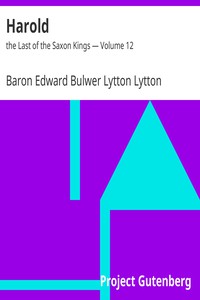Harold : the Last of the Saxon Kings — Complete, Lytton [best e reader for academics .txt] 📗

- Author: Lytton
Book online «Harold : the Last of the Saxon Kings — Complete, Lytton [best e reader for academics .txt] 📗». Author Lytton
Unconscious, happily, of these attempts to blacken the name of his dying father, Harold, towards the grey dawn succeeding the fifth night, thought that he heard Godwin stir in his bed. So he put aside the curtain, and bent over him. The old Earl’s eyes were wide open, and the red colour had gone from his cheeks, so that he was pale as death.
“How fares it, dear father?” asked Harold.
Godwin smiled fondly, and tried to speak, but his voice died in a convulsive rattle. Lifting himself up, however, with an effort, he pressed tenderly the hand that clasped his own, leant his head on Harold’s breast, and so gave up the ghost.
When Harold was at last aware that the struggle was over, he laid the grey head gently on the pillow; he closed the eyes, and kissed the lips, and knelt down and prayed. Then, seating himself at a little distance, he covered his face with his mantle.
At this time his brother Gurth, who had chiefly shared watch with Harold,—for Tostig, foreseeing his father’s death, was busy soliciting thegn and earl to support his own claims to the earldom about to be vacant; and Leofwine had gone to London on the previous day to summon Githa who was hourly expected—Gurth, I say, entered the room on tiptoe, and seeing his brother’s attitude, guessed that all was over. He passed on to the table, took up the lamp, and looked long on his father’s face. That strange smile of the dead, common alike to innocent and guilty, had already settled on the serene lips; and that no less strange transformation from age to youth, when the wrinkles vanish, and the features come out clear and sharp from the hollows of care and years, had already begun. And the old man seemed sleeping in his prime.
So Gurth kissed the dead, as Harold had done before him, and came up and sate himself by his brother’s feet, and rested his head on Harold’s knee; nor would he speak till, appalled by the long silence of the Earl, he drew away the mantle from his brother’s face with a gentle hand, and the large tears were rolling down Harold’s cheeks.
“Be soothed, my brother,” said Gurth; “our father has lived for glory, his age was prosperous, and his years more than those which the Psalmist allots to man. Come and look on his face, Harold, its calm will comfort thee.”
Harold obeyed the hand that led him like a child; in passing towards the bed, his eye fell upon the cyst which Hilda had given to the old Earl, and a chill shot through his veins.
“Gurth,” said he, “is not this the morning of the sixth day in which we have been at the King’s Court?”
“It is the morning of the sixth day.”
Then Harold took forth the key which Hilda had given him, and unlocked the cyst, and there lay the white winding-sheet of the dead, and a scroll. Harold took the scroll, and bent over it, reading by the mingled light of the lamp and the dawn:
“All hail, Harold, heir of Godwin the great, and Githa the king-born! Thou hast obeyed Hilda, and thou knowest now that Hilda’s eyes read the future, and her lips speak the dark words of truth. Bow thy heart to the Vala, and mistrust the wisdom that sees only the things of the daylight. As the valour of the warrior and the song of the scald, so is the lore of the prophetess. It is not of the body, it is soul within soul; it marshals events and men, like the valour—it moulds the air into substance, like the song. Bow thy heart to the Vala. Flowers bloom over the grave of the dead. And the young plant soars high, when the king of the woodland lies low!”
CHAPTER VI.
The sun rose, and the stairs and passages without were filled with the crowds that pressed to hear news of the Earl’s health. The doors stood open, and Gurth led in the multitude to look their last on the hero of council and camp, who had restored with strong hand and wise brain the race of Cerdic to the Saxon throne. Harold stood by the bed-head silent, and tears were shed and sobs were heard. And many a thegn who had before half believed in the guilt of Godwin as the murderer of Alfred, whispered in gasps to his neighbour:
“There is no weregeld for manslaying on the head of him who smiles so in death on his old comrades in life!”
Last of all lingered Leofric, the great Earl of Mercia; and when the rest had departed, he took the pale hand, that lay heavy on the coverlid, in his own, and said:
“Old foe, often stood we in Witan and field against each other; but few are the friends for whom Leofric would mourn as he mourns for thee. Peace to thy soul! Whatever its sins, England should judge thee mildly, for England beat in each pulse of thy heart, and with thy greatness was her own!”
Then Harold stole round the bed, and put his arms round Leofric’s neck, and embraced him. The good old Earl was touched, and he laid his tremulous hands on Harold’s brown locks and blessed him.
“Harold,” he said, “thou succeedest to thy father’s power: let thy father’s foes be thy friends. Wake from thy grief, for thy country now demands thee,—the honour of thy House, and the memory of the dead. Many even now plot against thee and thine. Seek the King, demand as thy right thy father’s earldom, and Leofric will back thy claim in the Witan.”
Harold pressed Leofric’s hand, and raising it to his lips replied: “Be our Houses at peace henceforth and for ever.”
Tostig’s vanity indeed misled him, when he dreamed that any combination of Godwin’s party could meditate supporting his claims against the popular Harold—nor less did the monks deceive themselves, when they supposed that, with Godwin’s death, the power of his family would fall.
There was more than even the unanimity of the chiefs of the Witan, in favour of Harold; there was that universal noiseless impression throughout all England, Danish and Saxon, that Harold was now the sole man on whom rested the state—which, whenever it so favours one individual, is irresistible. Nor was Edward himself hostile to Harold, whom alone of that House, as we have before said, he esteemed and loved.
Harold was at once named Earl of Wessex; and relinquishing the earldom he held before, he did not hesitate as to the successor to be recommended in





Comments (0)